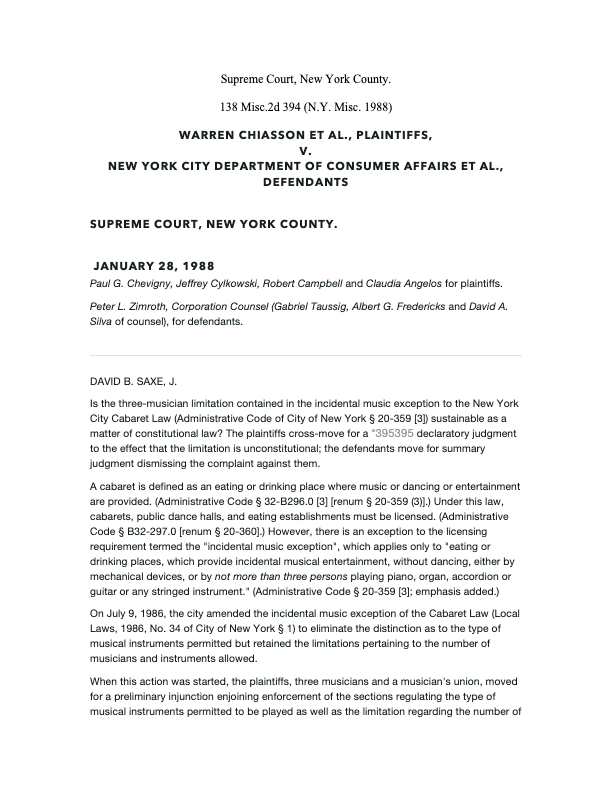Sugarman 2-12-2019 Letter to CPC Requesting Review of zoning regulations related to dancing.
Doc Category: Caselaw
Barnes v. Glen Theatre, Inc., 501 U.S. 560 1991
Muchmore v. City of New York – Opinion re Motion on the Pleadings
The United States District Court in the Eastern District of New York denied the motion by the City to dismiss the challenge of Muchmore to the Cabaret Law, but required additional briefing on the issues, though granting the City’s motion to dismiss Muchmore’s claim of violation of substantive due process.
Chiasson II
“Summary judgment is granted in favor of the plaintiffs declaring that the
portion of the incidental music exception of the Cabaret Law limiting the number of
musicians who can play at unlicensed establishments to three is unconstitutional.” The license referred to is the Cabaret License.
Festa v. NYC – Appeal Decision
The Festa case was appealed to the Appellate Division, First Department, which upheld the lower court: “Recreational dancing is not a form of expression protected by the federal or state constitution ( see Dallas v Stanglin, 490 US 19; Kent’s Lounge v City of New York, 104 AD2d 397, appeal dismissed65 NY2d 636). Accordingly, the Cabaret Law and attendant zoning regulations challenged by plaintiffs are subject to rational basis review ( Stanglin, supra). The legislative purposes in enacting these provisions were plainly legitimate, i.e., to protect the health, safety and general welfare of the public by limiting, inter alia, noise, congestion and various hazards in residential areas, and to protect the local retail development. It is manifest that the regulations, to the extent challenged by plaintiffs, bear the requisite rational relation to these permissible governmental objectives. We modify only to declare in defendants’ favor ( see Lanza v Wagner, 11 NY2d 317, 334, cert denied 371 US 901). [ See 12 Misc 3d 466 (2006).]”
Dallas v. Stanglin
Dallas v. Stanglin. A 1989 U.S. Supreme Court decision often cited for the proposition that dancing is not an expressive activity or association protected by the First Amendment: “coming together to engage in recreational dancing is not protected by the First Amendment.”
